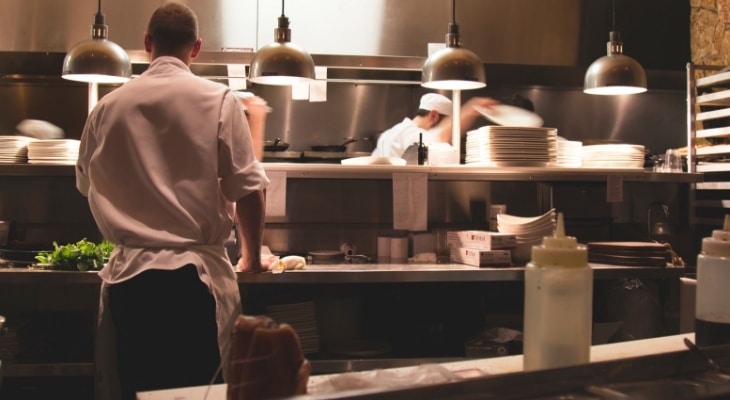The old saying goes, if you can’t stand the heat then get out of the kitchen.
It is a cliche that has rung true for a long period of time in the pressure cooker environment of the hospitality industry. But all of that is changing.
There is a new breed of chef now, ones driving significant movements to provide support and understanding for those already in the industry and new arrivals to the kitchen.
There have been too many chefs lost to the industry because of depression and anxiety. Some, like Australian celebrity chef Darren Simpson, global star Anthony Bourdain and even RUOK ambassador Jeremy Strode have died in their struggle.
Many chefs have vowed that their passings will not be in vain.
A new era of openness is dawning, with chefs coming forward and speaking of their struggles and offering a helping hand to others than may be finding the pressure of the industry too much.
Here are some of their stories.
“A LOT OF PEOPLE HAVE THE MINDSET THAT IT’S HEALTHY”
George Wintle is only 20, but the apprentice chef has already experienced the high level of stress the industry can place people under.
He has created an annual fundraiser called Eat The Issue for mental health, with the first event held in October, 2018.
Held in partnership with Melbourne-establishment Lee Ho Fook, the proceeds raised at the event will be donated to Melbourne City Mission’s program for youth hospitality training. This program is called HEAT (Hospitality Employment and Education) and offers training, guidance, counselling and presents a way a way to prepare young workers for the industry.
Wintle is happily settled at Oakridge Wines today, but he re-lives some of the nightmare experiences he faced before then at venue he chooses not to name.
“I was two weeks into the second year of my apprenticeship and there was something on a dish. The chef grabbed me by the collar, I was shaken up a bit, it really rattled me,” he said.
“It put me on the back foot for the rest of my time at the restaurant. I hung around for months and things didn’t get any better, there was verbal and physical abuse.
“That put me in a really big slump. As an apprentice I wondered if I could progress in an environment like that, not only in terms of skills and technique but as a person as well.
“Then I got into substance abuse and that really sent things downhill. When I resigned from that workplace, I didn’t find another job for a few months.”
Wintle wants to shatter the perspective that this kind of abuse is normal or healthy in the industry, which many young apprentices come to think.
“A lot of people have the mindset that it’s healthy,” he said.
“It can make people non-optimistic. Instead of thinking of doing bigger and better things, it brings people down,” he said.
“YOU WILL LOSE ALL OF YOUR FRIENDS NOW”
Being a chef can be isolating. You work different hours to your friends, shift work, split shifts. Wintle said any young chef wanting to enter the industry has to prepare for the inevitable.
“When I first started as an apprentice, I was told by my chef that I would lose all of my friends now,” he said.
“I thought the friends I had would be forever…I said ‘yeah right, I’m going to lose my friends’.
“But four years down the track, I only talk to one of those people. It can be very, very isolating.”
Wintle said the key was to extend the hand of friendship within the industry.
“You make lots of connections in the hospitality industry that you can buddy up with,” he said.
“It is isolating in a way, but there are also lots of other options to make friends from the community.”
“I STRUGGLED WITH MYSELF FOR A LONG TIME”
Shaun Quade was in his late 20s before he realised something was not right with his mental health. He was making all the cakes and breads for two different pastry shops, working 12 hours every day in a completely manic state.
It had been that way for almost a decade, punishing himself in the industry until he realised that something was not right.
“I have bipolar disorder and schizophrenia,” he says today, frankly.
After 10 years of channelling his obsessive compulsion into his work, he now takes medication and openly talks about his mental health with his colleagues and the general public.
“It doesn’t make sense that we don’t talk about it,” he said.
“The stigma attached to it is stupid, and I think we should change it.
“There are some days I don’t come in to work,” he says. “The guys know that if I came in, I’d just be an arsehole.”
These are some of the success stories, the courageous ones who have come forward and admitted that mental health issues are prevalent in the industry. They share their stories and offer guidance to ensure others know they are not alone.
Depression, anxiety and all other forms of mental illness can strike at any time and they do not discriminate. If you feel like something is not right, speak to your GP and be open and honest about your illness and your recovery. The industry is changing and the back door to the kitchen has been closed so the black dog can’t come in to drag another chef out.
If you or someone you know needs help, please contact Lifeline on 13 11 14.

